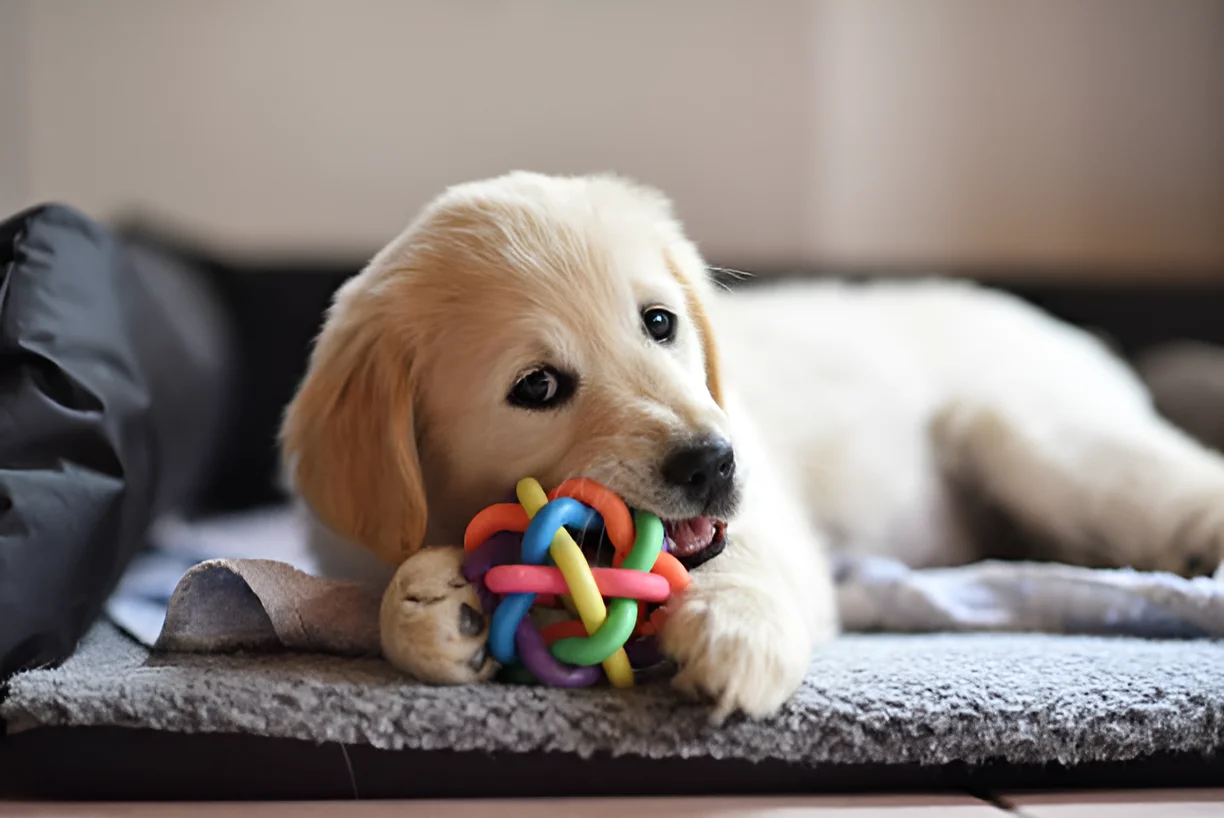Yes, Golden Retrievers are known to be tough chewers, especially during their puppy and adolescent stages. Let’s explore why this breed tends to chew so much, the potential issues it can cause, and how to manage and redirect this behavior effectively.
Golden Retrievers are beloved for their friendly, intelligent, and loyal nature. However, they are also known for their strong chewing tendencies. Understanding why Golden Retrievers chew, the stages of their chewing behavior, and how to manage it can help you maintain a harmonious home and keep your belongings safe.
Why Do Golden Retrievers Chew?
Chewing is a natural behavior for dogs, and Golden Retrievers are no exception. Here are some common reasons why Golden Retrievers chew:
1. Teething
- Puppy Teething: Like human babies, puppies go through a teething phase where they chew to relieve the discomfort of growing teeth. This phase typically occurs between 3 to 6 months of age.
- Adult Teeth: As they transition from puppy to adult teeth, the urge to chew can intensify.
2. Exploration
- Learning About the World: Puppies use their mouths to explore their environment. Chewing helps them understand textures and shapes, much like how human infants use their hands.
3. Boredom
- Mental Stimulation: Golden Retrievers are intelligent and active dogs. Without sufficient mental and physical stimulation, they may resort to chewing as a way to entertain themselves.
4. Anxiety and Stress
- Self-Soothing: Chewing can be a coping mechanism for dogs experiencing anxiety or stress. It helps them calm down and feel more secure.
5. Attention-Seeking
- Getting Noticed: Sometimes, dogs chew to get their owner’s attention, even if it results in negative attention.
6. Health Issues
- Medical Conditions: Occasionally, chewing can be a sign of underlying health issues, such as dental problems or nutritional deficiencies.
The Chewing Stages of Golden Retrievers
Golden Retrievers go through several stages of chewing behavior:
1. Puppy Stage (3-6 months)
- During this stage, puppies chew to alleviate teething pain. Providing appropriate chew toys can help manage this behavior.
2. Adolescent Stage (6-18 months)
- As Golden Retrievers grow, their chewing can become more intense. This stage requires consistent training and supervision to prevent destructive chewing.
3. Adult Stage (2 years and older)
- While adult Golden Retrievers may chew less frequently, they still need mental and physical stimulation to prevent boredom-related chewing.
Managing and Redirecting Chewing Behavior
1. Provide Appropriate Chew Toys
- Durable Toys: Invest in high-quality, durable chew toys designed for tough chewers. Toys made from rubber or nylon are often good choices.
- Variety: Offer a variety of textures and shapes to keep your dog engaged.
2. Exercise and Mental Stimulation
- Daily Exercise: Ensure your Golden Retriever gets plenty of physical exercise. Long walks, playtime, and fetch are great ways to burn off energy.
- Mental Challenges: Engage your dog with puzzle toys, training sessions, and interactive games to keep their mind active.
3. Training and Positive Reinforcement
- Teach Commands: Train your dog to understand commands like “leave it” and “drop it.” Use positive reinforcement to reward good behavior.
- Redirect Chewing: If you catch your dog chewing on something inappropriate, calmly redirect them to an appropriate chew toy.
4. Create a Safe Space
- Dog-Proofing: Remove or secure items that you don’t want your dog to chew on. This includes shoes, remote controls, and furniture.
- Crate Training: Use a crate or a designated safe area when you cannot supervise your dog. Ensure the space is comfortable and has appropriate chew toys.
5. Address Anxiety and Stress
- Comfort Items: Provide items that can help soothe your dog, such as a blanket or a piece of clothing with your scent.
- Calming Products: Consider using calming products like pheromone diffusers or anxiety wraps if your dog is prone to stress.
Health and Safety Considerations
1. Regular Vet Check-Ups
- Dental Health: Regular veterinary check-ups can help identify and address dental issues that may contribute to excessive chewing.
- Nutritional Needs: Ensure your dog is receiving a balanced diet to prevent nutritional deficiencies that could lead to chewing.
2. Safe Chew Toys
- Avoid Hazards: Avoid giving your dog items that can splinter or break into small pieces, such as cooked bones or certain types of rawhide.
- Monitor Playtime: Always supervise your dog when they are playing with new toys to ensure they are safe and appropriate.
Conclusion
Golden Retrievers are indeed tough chewers, but with the right approach, you can manage and redirect this behavior effectively. By understanding the reasons behind their chewing, providing appropriate outlets, and ensuring their overall well-being, you can help your Golden Retriever become a happy and well-behaved member of your family.
The photo featured below the post headline is Credit: Photology1971/istockphoto
I hope you find this post helpful and informative. If Yes’ feel free to share it with your friends!
Frequently Asked Questions
At what age do Golden Retrievers stop chewing?
Golden Retrievers typically reduce their chewing behavior as they mature, around 2 years of age, but they may continue to chew occasionally throughout their lives.
What are the best chew toys for Golden Retrievers?
Durable toys made from rubber or nylon are ideal for Golden Retrievers. Brands like KONG and Nylabone offer excellent options.
How can I prevent my Golden Retriever from chewing on furniture?
Provide plenty of appropriate chew toys, ensure your dog gets enough exercise, and use positive reinforcement to redirect chewing behavior.
Are there any health risks associated with excessive chewing?
Yes, excessive chewing can lead to dental issues or indicate underlying health problems. Regular vet check-ups are essential to monitor your dog’s health.

